Fate And Fault In A Ford Pinto: The Everyday Horror Of Cujo
Published on September 29th, 2011 in: Books, Halloween, Horror, Retrovirus |By AJ Wood
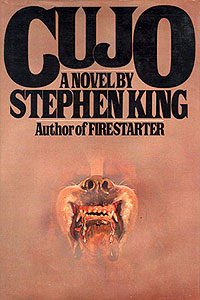
On a recent warm summer night I was re-reading my favorite Stephen King novel, Cujo, by the open window. Just as King was describing how the foamy-mouthed mangy dog was munching into a man’s throat with quite serious OM NOM NOM gusto, my cat decided to come to the window and play a little joke on me.
“Meow?” he said in his meanest, growlingest voice (at least as I heard it).
“AHHHHHHH!” I replied, my body jolting, nearly tossing my e-book across the room.
Two important things I learned that evening: 1) the same stuff I use to clean up the cat’s pee works well at cleaning up my own accidents and 2) exactly what it is about Cujo that really scares the bejeezus out of me.
<em>Cujo is one of my favorites, but I’ve found that a lot of King readers are a little dismissive of the novel. They seem to prefer the epic worlds of The Stand or It, or perhaps one of the more ghost-and-zombie type stories like ‘Salem’s Lot or The Shining. In any event, the big and rabid shaggy dog story from 1980 seems to go unnoticed. Even King himself refers to it as the book he can hardly remember writing, having been dealing with alcohol issues at the time.
Admittedly, it does sound a little ordinary. The Tommyknockers‘ big alien spaceship and the strange hold it has on humans or the creepy haunted hotel in The Shining . . . these things are by definition extraordinary. But that’s why this novel—about nothing more “spooky” or “out-there” than a rabid dog—really chills me to the core: it’s just so ordinary.
At the beginning of the book, we’re introduced to the Trentons of Castle Rock, Maine: Vic, Donna, and their four-year-old son Tad, who is terrified of the monster he can see watching him from the closet. Vic and Donna do their best to reassure him that there are no such things as monsters, that it’s all in his mind, but Tad knows better, weakly moaning to himself, “But there are monsters” after his parents have left him.
Is there really something in Tad’s closet at night, or just an odd lump of clothes and toys? We don’t know for sure, but in Castle Rock there are definitely monsters afoot. First, the narrator tells us of serial killer Frank Dodd, who was brought to justice a few years prior in their small town (a nod to King’s earlier book, The Dead Zone). Even with the passing of time, the idea of Dodd’s evil weighs on the minds of Castle Rock’s residents, an unwelcome Damoclesian reminder of what can lurk even in small towns.
Donna Trenton has her own monster to deal with in the form of Steve Kemp, a local handyman who has done some furniture restoration for the Trentons recently. Donna has also been carrying on an affair with Steve, and when she tries to break it off Steve becomes unhinged. Alone in the house with him, she finds herself honestly worried for her safety; he’s got a death grip on her arm and rage in his eyes. Later, when no one is home, Steve trashes the house in revenge, a wild beast let loose leaving nothing unturned, all the while growing a feral burn in his loins. Had anyone been alone with him, that person surely would have been savagely killed.
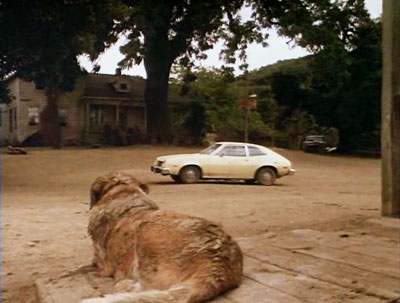
On the outskirts of town, Charity Camber has a simmering beast of her own in her husband Joe, who runs an auto shop out of their barn. Charity has spent a lifetime cowing to Joe’s brutish behavior, ruing the effects of such a role model on their ten-year-old son Brett. For her to suffer Joe is one thing, but to watch Brett deal with Joe’s mood swings and prejudices . . . Charity wants nothing more than a better life for her son, so when she wins a few thousand dollars in the lottery, she decides to go visit her sister out of state and take Brett with her, possibly escaping for good. Facing Joe down in the kitchen, Charity is careful not to show her lack of resolve, knowing Joe will quash the idea completely and forever if he notices any sign of fear.
Vic Trenton seems to have the most human and non-monster problem of anyone: trouble at the office. He runs an upstart ad agency and the account that pays most of the bills—Sharp Cereals—has just run into a huge PR nightmare. The red dye used in a batch of their cereals has caused kids to puke in vivid blood red, causing an internal-hemorrhaging scare among parents. What makes it worse is the theme of the ad campaign Vic had created for Sharp. A kindly middle-aged man in a cardigan sweater and classroom setting has been assuring children that when it comes to Sharp Cereal, “Nope, nothing wrong here.” The irony of such a slogan—one which has entered the common slang to mean “no sweat” or “OK”—tied to blood-red vomit is too much for late night chat hosts and stand-up comics to ignore. Sharp Cereals becomes the butt of every joke.
But this is not the first time Vic has offered assurances which may turn out to be untenable. To ease his son’s fears about the monster in the closet, Vic drafts the “Monster Words,” a short bedtime benediction which casts the beings from Tad’s bedroom and brings the boy enough peace of mind to get through the night.
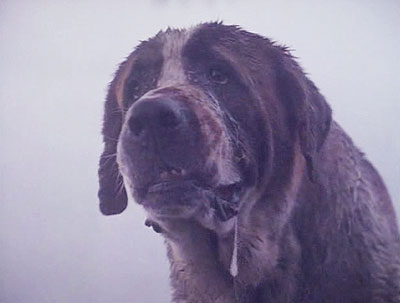
This sets us up for a few storylines coming together in pretty typical King fashion, not unlike the twists of Shakespearean tragedy: Donna’s Ford Pinto develops engine trouble, the Cambers’ dog Cujo is bitten by a bat while chasing a rabbit in the woods, Charity takes Brett to her sister’s place, and Vic has to go meetings in New York and Boston to sort out the Sharp Cereal fiasco. Soon after, Cujo comes down with rabies, goes mad, kills Joe and another neighbor, while Donna decides to take the Pinto in to Joe’s shop for repairs one afternoon.
Such plotting can seem trite especially when told in quick summary and when there is a picture of a snarling mad dog on the book cover. For today’s readers, “Cujo” has become shorthand for “when dogs attack,” so there’s no real mystery about where this is all headed, but that knot of mistake and coincidence is just the first real peek into the book’s essential horror.
Pinned in the stalled-out car under the hottest summer sun in recent memory, Donna sees not just rage and savagery in the rabid dog’s eyes but also a bit of recognition. She feels as though Cujo is out to get her and her son, personally. After all, reviewing all the disparate things that had coalesced to put them in this situation, how could she not start to think of this as her fate? Vic’s business trip, her affair with Steve, Tad’s naptime nightmare which rendered him too scared to stay with a sitter while she took the car in for repairs, and the Cambers family leaving (or had Cujo already been at them? Donna does not know for sure), it is as though Cujo has been waiting for her to arrive at this point his whole life.
But Donna is not normally given to thoughts of “fate” or “destiny.” She inwardly (and jealously) derides Vic’s Monster Words—which Tad has such faith in—as “hocus pocus.” When Tad whines, “Why is it so hot?” she tersely, yet completely honestly, replies, “The greenhouse effect.” When she starts to feel a bit like cracking up after a day stuck in the car—maddeningly close but still too far from the house—she takes refuge in concepts learned in college psychology classes. She tells herself she doesn’t have the “luxury of lying to herself” about her position.
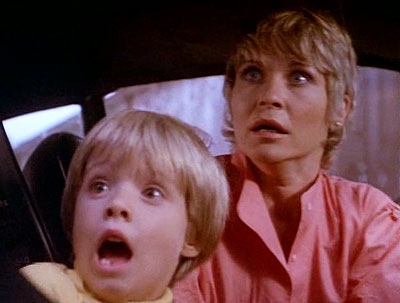
Meanwhile, hocus pocus is all that little Tad has to go on: the magic of his father’s Monster Words, which Vic wrote out for Tad, who has that paper folded up in his pocket in the car. From the beginning of the trip, Tad reaches for the sheet to assuage his fears, but time and time again they do as little to help him as Donna’s more scientific method does to help her.
Interestingly, the POV switches to describe Cujo’s illness at these points as well, describing in cold, clinical terminology the effect the virus is having on the dog’s physiology, destroying his nervous system and his brain. From his position of aching, throbbing pain and confusion, Cujo can only think of Donna and the boy in the car as the reason for it all. If only they weren’t there, this torture might end for him.
This idea of a character being “controlled” by something outside his or her control is not new to Stephen King. In The Stand, mentally weak and gullible (not to mention abused) Trashcan Man is used by the very Devil in the guise of Randall Flagg to help with his plots. In The Shining, evil spirits slowly weaken a guilt-ridden and alcoholic man to help carry out their plans for the man’s son. But what’s interesting about Cujo is that it’s not some mythic devil figure or weird ghosts pushing otherwise healthy(ish) people into committing some horrific acts. It’s as simple as a virus infecting a dog.
No matter from which angle you approach, the end result is the same: a woman and her son are trapped in a car by a rabid dog. Donna struggles with thinking of this situation as the dog’s fault, or the virus’s fault, or Vic’s fault for not taking the car in sooner, or any of thousand other things, but the narrator keeps pointing out to us the dreadful fact that it’s no one’s direct fault. For any one accusation, there’s a simple explanation of why it’s not the fault of that character.
This even works in the narration’s treatment of the animals: Cujo was a dog; dog chase rabbits for fun; the rabbit was just trying to stay alive and ducked in that cave for protection; the bat, for its part, was just scared when its wing was caught in Cujo’s bite, so it lashed out as it knows to do when in trouble. There’s no karmic payback here, no malevolent force at work, just cause and effect. Seemingly unrelated things—humans, machines, animals, weather, location—just happened to come together like this.
To bring up Vic’s trouble at work at this point may seem banal, but another great aspect of the book is how this non-violent and prosaic subplot reveals aspects of the real physical danger Donna and Tad are in. The issue Vic is dealing with is basically one of fault. To the public, the cereal causes internal bleeding. To the heads of Sharp Cereals, it wasn’t their product, but the dye they were provided and which they used in just one batch of one kind of cereal. The dye manufacturer defends himself by saying it’s not actually the dye that made anyone sick, it just stayed unnaturally red after being eaten. In all the cases of illness, the children had a “normal” stomach flu, but the defective dye caused a panic when parents saw such technicolor vomit. Who will end up paying for it in the end, however, is Vic’s small ad agency and their brilliant-but-now-ironic slogan: “Nope, nothing wrong here.”
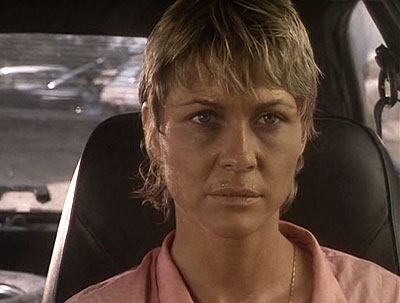
Vic’s ad agency and its slogan, Tad’s Monster Words, Donna’s affair, Charity’s hidden reasons for an out-of-state visit . . . the world of Cujo is essentially one full of liars. They’re often well-intentioned liars, to be sure—perhaps we can soften it by saying they’re not telling the “full” truth, or that they’re just giving an optimistic and spun version of the truth—but still, they are liars all the same.
Charity tries to assure Brett that everything is fine back home when they can’t get Joe on the phone, but she secretly feels that something is not right. As the narrator puts it: “She would say nothing that was a lie. She would lie to her son.” She goes on to convince her son (and perhaps herself) that his father just went off on a hunting trip.
Even someone as incidental to the main story as the actor portraying the professor in the Sharp Cereal commercials is distraught that he’s been portrayed as a liar, after having assured all those children that nothing was wrong for so long.
Characters’ subconscious minds play dreams to point out their own lies to themselves. Vic has dreams of Tad in trouble where Tad accuses him of lying about the Monster Words. “They don’t work!” his son sobs, succumbing to dangers from which dream-Vic cannot save him. Donna has similar dreams of Vic being present, but not actually saving them from the car. Worried about his dog (and father) back home, Brett’s stress leads him to start sleepwalking again for the first time in many years, pantomiming his morning ritual of feeding Cujo. These characters try to understand and get a hold of their emotions in these situations, but in the long run they are still uncertain, scared, and know they can do nothing.
We can try to put faith in science, TV commercials, our parents’ wisdom, or just good old common sense, but none of these can save you from fate, destiny, fortune, random chance, or the confluence of events. It was random chance that Charity won the lottery money that allowed her to take her son away, but there was just as much random chance involved in putting Donna and Tad in a such a situation with a rabid dog. What can we do but shrug our shoulders a little and shake our heads wistfully at what might have been had just one thing been different.
But one thing wasn’t different and it did happen in Stephen King’s Castle Rock. In the real world, dogs become rabid, trouble happens at the office, and people are stuck in isolated places, while others win the lottery, so maybe this isn’t so far off the It Could Happen scale. . .
The most important theme of Cujo is the horrid knowledge of hopelessness and the keen awareness that the only defense we have against that knowledge is a mental placebo, that whistling-by-the-graveyard, gallows humor. Be it a spooky, foggy All Hallow’s Eve or a July pool party or just the act of taking your car into the shop, this could be quite a unique situation. Your neighbor could be a serial killer, quietly sawing though a dead human thigh right now. You could be just reading stuff on a webpage when a rabid pet charges for your jugular. You’ll only know when you realize you never saw it coming, but by then it’s probably too late.
Time limit is exhausted. Please reload the CAPTCHA.